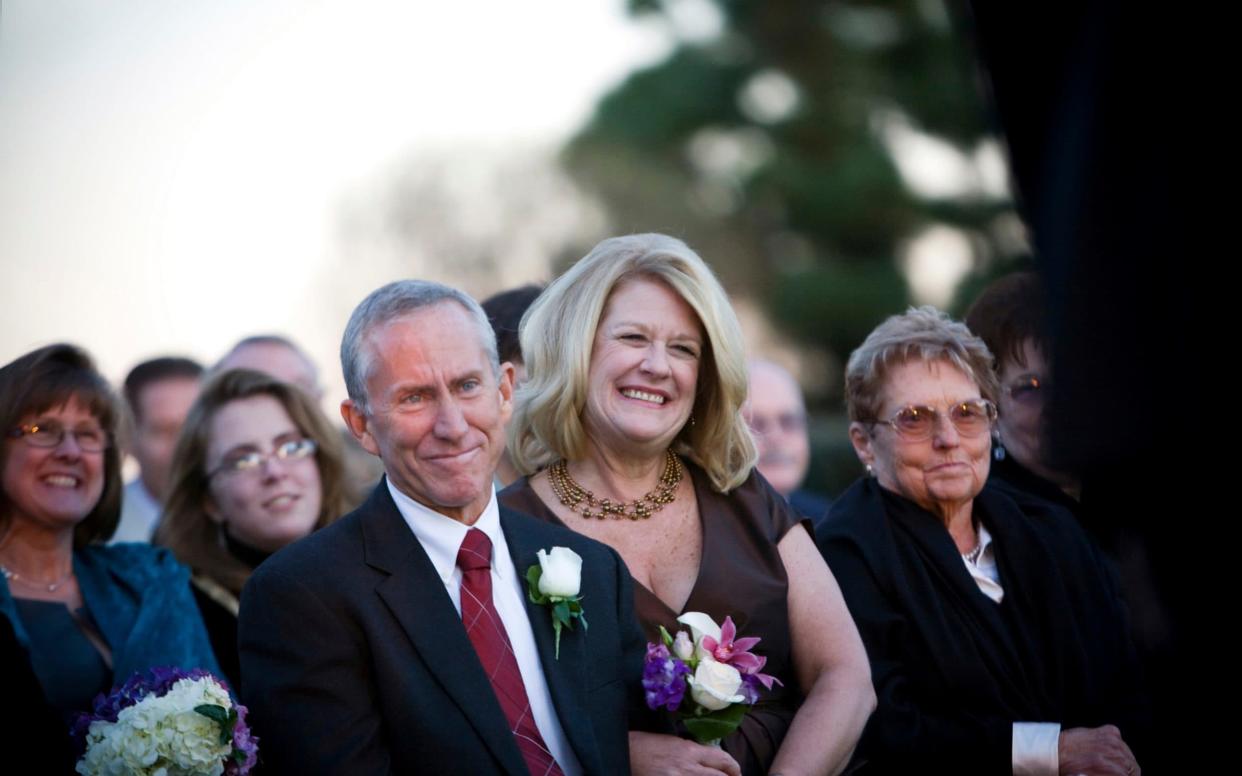A complete guide to etiquette for mothers and fathers of the bride and groom

You gave them life, stayed up all night when they couldn't sleep, waved them off to their first day at school and then in the blink of an eye they were grown up.
You'd got used to the fact they're paying their own bills and calling you from the 'office' but now the biggest change in their lives, and your relationship, is on the way. They're getting married and that means a whole new dynamic and, of course, a new member of the family, too.
So as well as biting your tongue and being as impartial as a judge, what are your actual responsibilities both before and on the wedding day itself? Read on to see what tradition (and Debrett's) says you should and shouldn't be doing...

Etiquette basics... where to start
With any luck you'll be well acquainted with your child's beloved by now and you may even really like them, so the thought of the pair uniting in marriage hopefully won't be too distressing.
And no doubt you've been dreaming of your child's wedding day for as long as they have, as well as saving up for just this occasion, so it's natural you're not only feeling excited at the prospect, but deeply invested too.
But as with many events that involve families and emotional relationships, weddings tend to bring out both the best and worst in people. Feelings can get hurt and offence can be taken, even when none was intended.
And that's before you take into account the fact that many families have strained interactions anyway or that the presence of divorced parents, step-parents and children can also add to the complexity.
So how do you avoid the conflict and just enjoy watching your son or daughter get married? How do you embrace their partner's family and remain calm and supportive?
Remembering that this is supposed to be a joyful time is a good place to start and the bigger picture should always be front of mind.
If you're paying for part, or all of the wedding, you may feel your wishes should be given priority, but at the end of the day, this is your child's wedding, not yours. And while there should be compromise on both sides, it might be time to exercise that incredible skill you've developed over the years of putting your children first... yes, again.
William Hanson, a world renowned etiquette expert and coach who works with private and corporate clients all over the world, agrees. "It’s not your wedding," he says. "It’s their day and if you don’t like it, say nothing. It’s hopefully the only wedding they're going to have and they're going to remember it for life. You want them to remember it for the right reasons."
You have to ask yourself if an argument over something small is worth it. "If they want something terrible that you morally don’t agree with, fair enough," says Hanson. "But if they want yellow flowers in the chapel and you want pink, let them have yellow flowers. At the end of the day they’re just flowers."

And if you think some meddling won't have a detrimental effect on proceedings then let the following modern fairy tale be a warning. We know of one engaged couple that was getting so much grief from both sets of parents that they wrote a letter to their families explaining very clearly, that this supposedly happy time was being ruined, and if they didn't stop being so controlling they would elope. Sure enough, the mums and dads backed off and let the kids get on with it.
Laura*, 27, from London is in the midst of planning her wedding and while she's experienced some issues with her parents along the way, she's loved having their input. "It was very important to involve them in the planning process," she says. "I can be a bit of a control freak but as the first one of my siblings to get married, my parents have been super excited, so I see how much joy it brings them to feel involved. Also both my parents and in-laws-to-be have been very generous in helping us financially with the wedding, so we felt it was only fair to include them in some of the decisions".
When her dad was insistent that they should employ an opera singer to serenade the guests during drinks and canapé's, however, she felt the need to step in. "I don’t listen to opera music, nor does my fiancé, and I personally can’t think of anything worse than someone belting out Pavarotti at full pitch while our guests are trying to chat. He was quite persistent, but I nipped it in the bud quickly."
Mother of the bride
If the bride's parents are paying for the wedding (or the majority of it), it's usual for the mother of the bride to take a central role in the planning.
Depending on your relationship with your daughter, you may be asked to take charge of whole aspects of the day, especially if you're hosting it at the family home. So you could find yourself liaising with suppliers, booking cars and going along to food consultations.
But if you don't feel you can take on such an active role then be clear from the start and suggest a few areas where you'd specifically like to be of help instead. Approach the whole process as a collaboration and endeavour to keep your daughter's wishes at the forefront, while offering advice and the benefit of your experience.
"It’s normally the micro details that mothers of the bride and groom get cross about," says Hanson. "It’s all the minutiae and you think, at the end of the day, does it matter?" So, try not to sweat the small stuff essentially.
One definite 'don't' is to not get over excited, inviting friends and relatives to the wedding before the actual guest list is compiled. If you're not sure how many people from your side can be accommodated, then avoid any potentially awkward backtracking by waiting for a confirmed number from the bride and groom.
Custom dictates that you should stay away from the colours being worn by the bridesmaids and, of course, no white
This was a major bone of contention for our bride. "I think it’s a universal sticking point when it comes to wedding planning," she says. "We wanted our parents to have a say in the guest list so asked them to write a list of family and friends they wanted to invite before we even started looking at venues. It all seemed pretty straight forward but since then, they’ve asked us to invite random work colleagues we’ve never met, they’ve invited people without asking us and even asked us to un-invite a couple they originally had on their list! All very stressful."
Even if you're not taking on full responsibility for some areas, you will no doubt be asked to help your daughter choose her dress. This is a special experience and we recommend making a whole day (or two) of it, with a nice lunch and glasses of champagne to celebrate in style. Seeing your daughter in a wedding gown will be emotional so don't forget to carry tissues and while honesty is usually the best policy, if she falls in love with a dress you're not crazy about, then it's probably best not to take the shine off it for her by saying so.

"When I was going dress shopping I wanted to invite my mum and step-mum as I’m close to them both and value their opinions," says Laura. "But I was really worried my mum would be offended or it would be really awkward as they don’t have much to do with one another.
"But it turned out I was completely overthinking it and we had a lovely day, everyone got on and I found a dress! I think that’s one thing I’ve found from wedding planning. It sounds cheesy but it does bring people together and people put their differences aside."
There's other exciting shopping to do too, don't forget; your Mother of the Bride outfit. Custom dictates that you should stay away from the colours being worn by the bridesmaids and, of course, no white. You wouldn't want to upstage your own daughter now would you. This is another chance to spend some quality time with her before the big day, so relish every moment.
Once you've chosen your look, you should let the groom's mother know the length, colour and style so she can pick something complementary.
No matter how involved you are in the planning, it's important to enjoy the whole process as much as possible. You'll see new sides to your daughter, bond over any problem solving and you should have a lot of fun too. "My mum has been a great listener," agrees Laura. "When I’ve become really stressed out and needed someone to help put things in perspective, at my most bridezilla moments."
On the day
1. As well as getting yourself glammed up, you may be needed to help your daughter get dressed. Remaining your usual, unflappable self will help the morning pass smoothly.
2. The Mother of the Bride usually travels to the ceremony with the bridesmaids in a vehicle organised by the bride. So say your goodbyes before you set off.
3. Once at the church or venue, you will be the last to be seated before the bride arrives. If sticking to tradition then you'll be escorted to your place by the chief usher.
4. During the service, you'll sit on the left of the aisle with the father of the bride, or whoever is fulfilling that role on the day.
5. You may be asked to sign the register and once it's all over, you'll walk back down the aisle with the groom's father.
6. At the reception you'll be in hostess mode, welcoming guests and helping them to mingle and circulate. You will also be required to pose in lots of photographs so get practicing that beaming smile.
Father of the bride
So your little girl is getting married.
As the father of the bride, you'll no doubt be experiencing a range of emotions, with shock at the average cost of a UK wedding near the top of the list.
It's £27,161 by the way.

But however you're feeling about handing over your daughter to the care of another man, you do have a few specific tasks to carry out, whether you're paying for the whole shebang or not.
You will undoubtedly be called upon for advice or to help organise certain elements of the wedding, particularly if you're hosting with the mother of the bride. With many families not fitting into traditional nuclear dynamics, this will, of course, depend on the individual situation.
On the day
1. You'll have some valuable father-daughter time as you travel to the ceremony together. Use these minutes to calm her nerves and to offer some advice about life and marriage.
2. Once you're at the church (or venue where the service is taking place) you'll wait as her chief bridesmaid attends to her dress and train and then walk her down the aisle on your right arm. This is where you beam with pride.
3. Once at the front, when the registrar or religious leader asks; 'who gives this woman to this man?' (or some similar words) you should place the bride's right hand on theirs.
4. During the service, assuming relations with the bride's mother are positive, you will sit next to her on the left hand side of the aisle and will join her in the registry for the signing of the register.
5. When it's all done and dusted, you'll walk back down the aisle with the mother of the groom on your arm.
6. The father of the bride speech... You might not be looking forward to this if you don't like public speaking or have little experience of it, but it's a wonderful opportunity to say some heartfelt words about your daughter and to thank those who have helped to organise the wedding, as well as to welcome your new son-in-law into the family. Read our ultimate guide on how to write and deliver a memorable father of the bride speech and you'll do her proud.
The parents of the groom
In the past, the groom's parents weren't necessarily involved in wedding arrangements to any great degree, other than as a support to their son and future daughter-in-law. The onus was on the bride's parents to both pay for and organise the logistics of the day.
But with more and more modern weddings being paid for by the happy couple, and with non-traditional family set-ups becoming the norm, there's more scope for the groom's mother and father to be included in the planning.
Many parents of the groom now offer to pay for one element of the day if the bride's parents are footing the bill for the majority. So if you're in a position to be able to do so, perhaps suggest that you pay for an open bar or why not organise a lunch for the next day or a dinner the night before the wedding?
Basically you can be as involved as you'd like to be, so be open from the start about wanting to contribute in some way. As with the bride's parents, try to remain focused on the big picture and if you have any concerns about the plans, express them as diplomatically as possible. "Offer to help your daughter or son," says Laura. "But don’t be too overbearing or they will resent you and potentially leave you out of decision making the next time."
On the actual day itself, unless the happy couple have requested you do a speech or have given you a specific task to carry out, then your responsibilities are minimal.
Arrive promptly, take your place in the seats behind your son and his best man and relax and enjoy this special moment.
The mother of the groom traditionally leaves on the arm of the father of the bride while the groom's father will escort the mother of the bride back down the aisle.
So whether you're a parent (step or otherwise) of the bride or the groom, you can have a huge influence on how happy their wedding day is. In most circumstances they'll want you to be involved so try not to get too caught up in your own vision for the day. No matter how much you wanted that opera singer.
*not our bride's real name.


 Yahoo News
Yahoo News 
